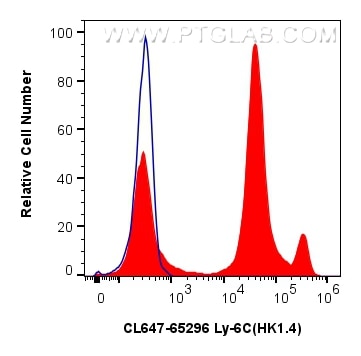Tested Applications
| Positive FC detected in | mouse bone marrow cells |
Recommended dilution
| Application | Dilution |
|---|---|
| This reagent has been tested for flow cytometric analysis. It is recommended that this reagent should be titrated in each testing system to obtain optimal results. | |
| Sample-dependent, Check data in validation data gallery. | |
Product Information
CL647-65296 targets Ly-6C in FC applications and shows reactivity with Mouse samples.
| Tested Reactivity | Mouse |
| Host / Isotype | Rat / IgG2c |
| Class | Monoclonal |
| Type | Antibody |
| Immunogen | L3 cloned CTL cells Predict reactive species |
| Full Name | lymphocyte antigen 6 complex, locus C1 |
| GenBank Accession Number | BC010764 |
| Gene Symbol | Ly-6C |
| Gene ID (NCBI) | 17067 |
| RRID | AB_3673578 |
| Conjugate | CoraLite® Plus 647 Fluorescent Dye |
| Excitation/Emission Maxima Wavelengths | 654 nm / 674 nm |
| Form | Liquid |
| Purification Method | Affinity purification |
| Storage Buffer | PBS with 0.09% sodium azide. |
| Storage Conditions | Store at 2-8°C. Avoid exposure to light. Stable for one year after shipment. |
Background Information
Ly-6C (lymphocyte antigen 6 complex, locus C) is a 14-17 kDa GPI-linked cell surface antigen that belongs to the Ly-6 family of glycosyl phosphatidylinositol-anchored surface glycoproteins (PMID: 9192663). Ly-6C is expressed on mouse monocytes/macrophages, endothelial cells, granulocytes, thymocytes, and some T cell subsets (PMID: 2849552). The two alleles of Ly-6C, Ly-6C.1 and Ly-6C.2, result in differential expression of this protein on subpopulations of CD4+ T cells (PMID: 15057973; 9126982). Ly-6C has been reported as a marker of memory CD8+ T cells (PMID: 7543536).
Protocols
| Product Specific Protocols | |
|---|---|
| FC protocol for CL Plus 647 Ly-6C antibody CL647-65296 | Download protocol |
| Standard Protocols | |
|---|---|
| Click here to view our Standard Protocols |



